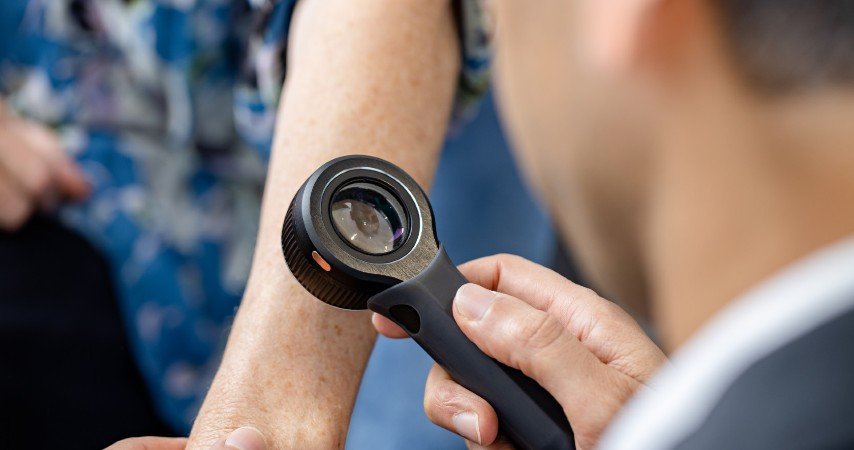All Services
Face
Breast
Body
Skin and soft tissue cancer
Hand surgery

We live in a sunburnt country, and skin cancer is incredibly common in our fair-skinned population who have enjoyed life outdoors. In fact, two in three Australians are diagnosed with skin cancer by the time they’re 70. So it’s little wonder that Australia has one of the highest rates of skin cancer in the world.
Skin cancer is commonly diagnosed by your family doctor through skin clinics or dermatologists. Often the skin cancer may be obvious, though sometimes a biopsy sample of the lesion is taken to check.
At Central Day Surgery, our highly experienced plastic surgeons have been completing skin cancer removal surgeries for years. While recovery times vary, our gentle yet thorough approach helps ensure that our patients recover smoothly, getting back to their day to day activities sooner.
Skin cancer is defined as the uncontrolled growth of abnormal skin cells. There are three types of skin cancer: basal cell carcinoma (BCC), squamous cell carcinoma (SCC) and melanoma.
Basal cell carcinoma and squamous cell carcinoma are considered to be far more common than melanoma.
95% of skin cancer is caused by exposure to ultraviolet rays (UV). When your skin is exposed to UV radiation without protection, it can affect how the skin cells look and behave.
UV radiation has nothing to do with the temperature and can not be seen or felt. In fact, Australia is exposed to high levels of solar UV radiation all year round. It’s also important to note that while most UV comes from the sun, it can also come from artificial sources such as solariums and arc welders.
Basal cell carcinoma (BCC) is the most common type of skin cancer and the least dangerous. This cancer grows slowly and steadily in the area it starts and rarely spreads elsewhere. However, if left, they can make non-healing sores that easily bleed and invade important structures.
Surgery for Basal cell carcinoma (BCC) is a very common procedure – removal with a comfortable margin of normal skin is usually curative. Your plastic surgeon at Plastic Surgery Central has the skill and care required to treat BCCs surgically.
Squamous cell carcinoma (SCC) is another common form of skin cancer, which can vary from early thin lesions with slow growth in the same area to more rapidly growing and dangerous lesions.
Squamous cell carcinoma (SCC) that behaves aggressively is less common but can spread to distant sites (like lymph glands or through the bloodstream to the lungs). These tumours are managed with surgery to ensure removal with an adequate clearance margin.
Melanoma is a form of skin cancer that develops in the pigment cells of your skin, known as melanocytes.
Melanocytes produce melanin which helps protect your skin from UV. When these cells aggregate together in the skin, they form a mole.
While the majority of moles are harmless, sometimes the melanocytes in a mole begin to grow in an uncontrolled way. If they expand either outwards or down into the lower layers of your skin, they can result in melanoma cancer.
Melanoma is the most serious form of skin cancer, and if left untreated, it can spread to your dermis, enter your lymphatic system or bloodstream and then go on to other parts of the body such as the brain, lungs or bone.
Not all skin cancers look the same, and it can be hard to know what to look for. This is why it is beneficial to get regular skin checks with your GP or skin doctor. However, here are the signs to look out for in-between appointments:
Spot/mole that looks different and may feel slightly rough compared to other spots on your skin
Spots that have changed in size, shape, colour and texture
Skin sores that haven’t healed properly within a few weeks
Sores that are itchy and bleed.
If you notice any of the above signs, get your skin checked by a professional as soon as possible.
After your procedure, our team will guide you through each step of recovery. You’ll receive clear aftercare instructions and wound care advice, along with follow-up appointments to check on your healing. Some swelling or tenderness is common in the first few days. Keeping the area clean and protected from the sun can support healthy healing and help reduce scarring. If you have any questions or concerns during recovery, our nurses and surgeons are always available to help.
Prevention is always better than cure. Skin cancer is the most preventable of all common cancers, with almost all cases of skin cancer caused by exposure to UV Rays.
You can help prevent developing skin cancer by implementing the following:
At Plastic Surgery Central, all procedures are performed by qualified Specialist Plastic Surgeons (FRACS) with extensive experience in skin cancer treatment and reconstruction. Our approach focuses on clear communication, patient safety, and ongoing support throughout every stage of care. From diagnosis to recovery, our team provides professional guidance and a calm, supportive environment to help you feel informed and confident in your treatment plan.
Skin cancer is defined as the uncontrolled growth of abnormal skin cells. There are three types of skin cancer: basal cell carcinoma (BCC), squamous cell carcinoma (SCC) and melanoma.
Basal cell carcinoma and squamous cell carcinoma are considered to be far more common than melanoma.
Yes. A biopsy is often performed to confirm the diagnosis and guide appropriate surgical treatment
Depending on size and location, reconstruction may involve direct closure, skin grafts, or local flap techniques.
Regularly check for new or changing moles, rough patches, or non-healing sores, and see your doctor promptly.
Non-surgical options exist for some cases, but most skin cancers are best treated with surgical excision.
Please be aware that all surgical procedures require a consultation with our plastic surgeons to allow a thorough assessment and discussion of your specific needs.

